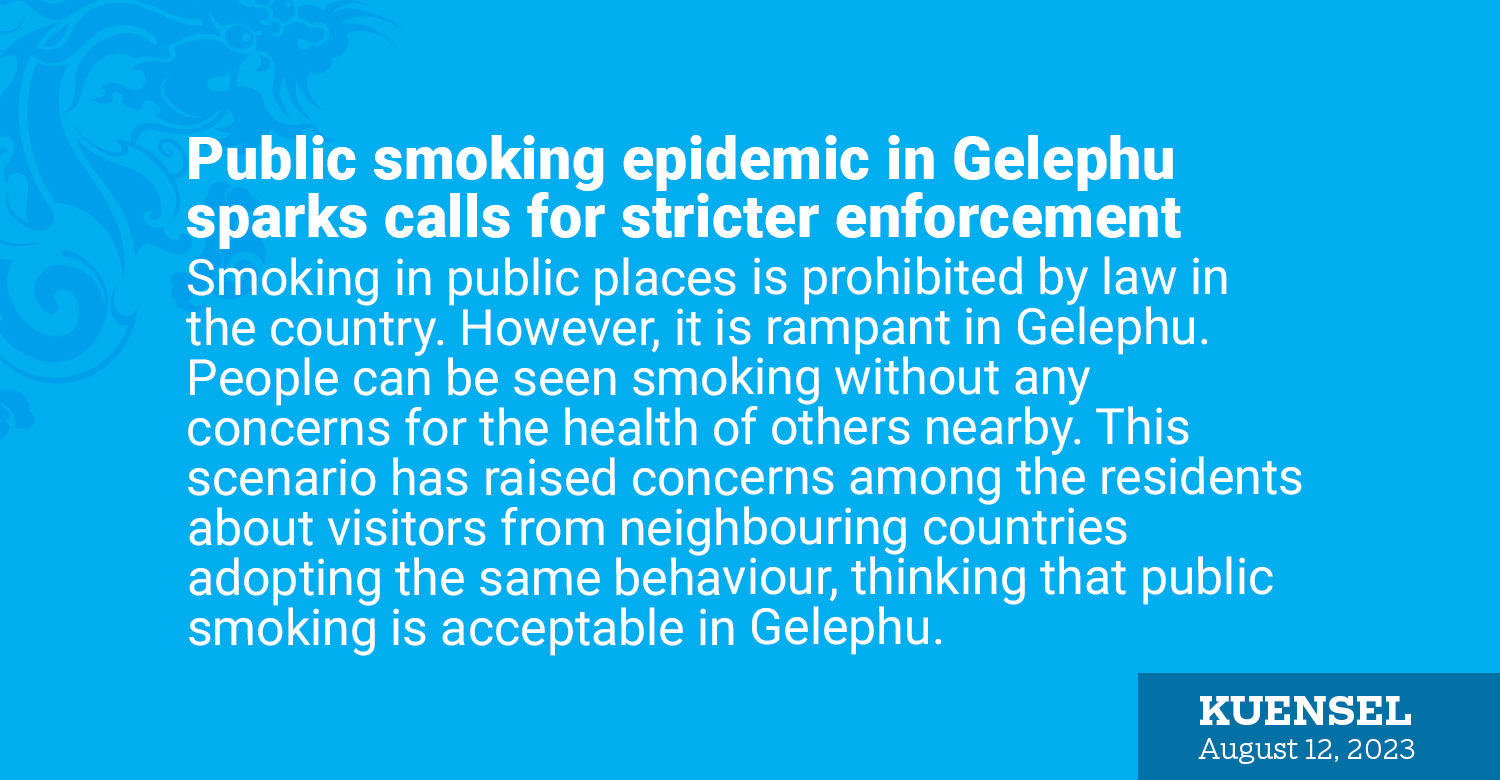Lhakpa Quendren
Smoking in public places is prohibited by law in the country. However, it is rampant in Gelephu.
People can be seen smoking without any concerns for the health of others nearby. This scenario has raised concerns among the residents about visitors from neighbouring countries adopting the same behaviour, thinking that public smoking is acceptable in Gelephu.
A resident, Kezang Tshomo, said that there is a need to intensify the monitoring and enforcement efforts.
“While people have the right to smoke, they should respect non-smokers by refraining from smoking in public areas. Being a border town, public smoking gives a bad impression among expats or visitors,” she said.
Another resident said that the law enforcers do not take adequate measures to respond to such incidents. He added that the instances of people smoking in public areas are quite common, but they have never heard of any penalties being imposed on law violators.
He said more public awareness and participation is needed.
“People become vigilant whenever inspections are conducted, but it again goes back to its normal situation after some time. So, awareness among people is necessary for effective implementation of the law.”
Residents also point out that cigarette and tobacco products are available in the majority of the shops and some vendors even allow their customers to smoke on the shop premises. Furthermore, ‘No Smoking’ boards are missing in many shops.
An official from the Bhutan Food and Drug Authority said that despite the continued advocacy and sensitization programmes, people are still found smoking in public places.
“Any area with more than two people is considered as a public place and if a person is found smoking in a public place, they should be fined,” he said.
He said that a designated smoking zone should be established within entertainment venues, hotels, restaurants, and snooker rooms, among others. “However, there are no designated areas in open spaces, which means smoking is prohibited outside these designated zones.”
Despite grappling with a shortage of manpower, he said, the authority will send inspectors to Gelephu for surprise inspections. “Currently, our inspectors are in Samtse.”
The official said that the police have been empowered under the Tobacco Act to enforce its provisions and monitor the situation accordingly. “We will once again request the police headquarters to issue instructions to their divisions.”
Police officials said that people tend to smoke in the open areas of their preference due to the absence of designated smoking zones. “It is common sense of people to advise against smoking in public places. It is everyone’s responsibility, but there can be hesitancy because we don’t know how smokers might react.”
The Tobacco Act states that the person in charge who finds a person smoking in places other than the designated area shall request the offender to refrain from smoking. No person shall smoke outside the designated smoking areas in public places, including public transportation.
If the person continues to smoke, the person in charge shall demand the offender to leave the place or transport, otherwise report to an authorized officer or law enforcement personnel.
Agencies and institutions that fail to display ‘No Smoking’ signs will be liable for a fine of Nu 1,000 and a fine of Nu 500 will be imposed for smoking in restricted areas. And a person responsible for the premises will be subject to a fine of Nu 1,000 per person found smoking on the premises.
In July 2021, the government amended the Tobacco Act 2010, lifting a decade-long prohibition on tobacco sales. The revision allows for the sale of tobacco products in both grocery and ‘pan shops’. It also tasked the Bhutan Duty-Free to supply stocks to authorised micro general shops.
The Prime Minister then repeatedly said that the Act amendment does not allow smokers to smoke in public places. He said that the regulations remain unchanged and erstwhile Bhutan Narcotic Control Authority and the RBP are responsible for overseeing and penalising those smoking in public places.
The Tobacco Act was amended as an urgent Bill in the summer session, considering the issue of tobacco products being smuggled across the porous southern border. Such illicit activities were identified as one of the main factors contributing to the spread of the Covid-19 virus in the country.


